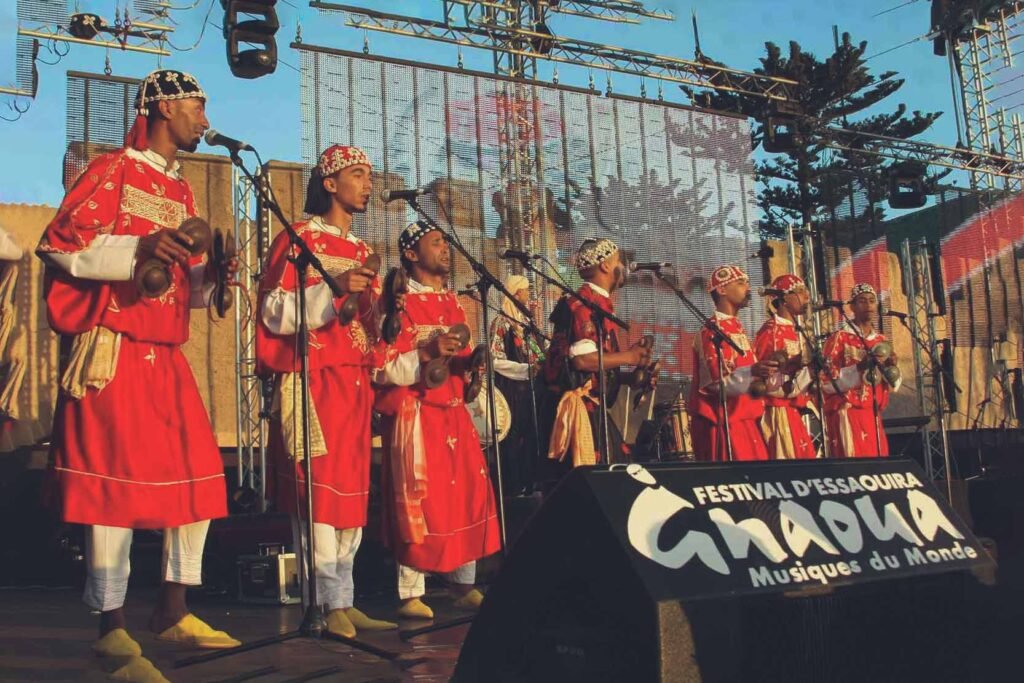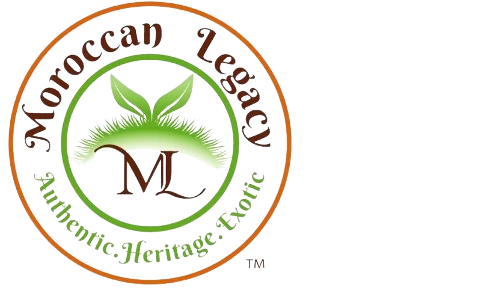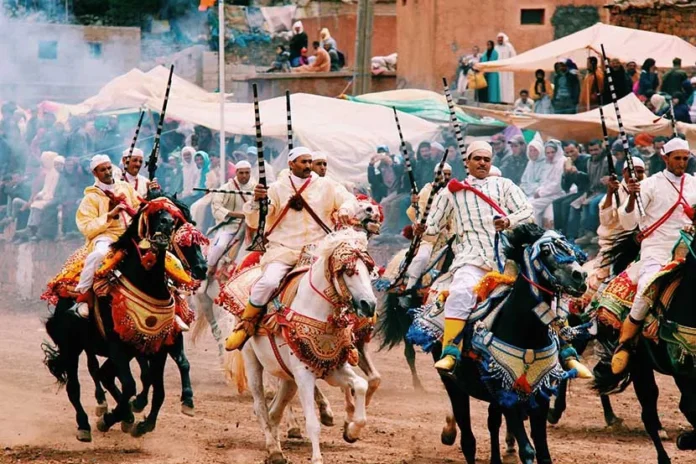Introduction
Moroccan Traditions: Greetings, readers! I hope you all are doing well. Today, I want to take you through Morocco’s diverse and colorful festivals and celebrations. As someone who has enjoyed visiting this beautiful North African country, I was in awe of how deeply ingrained traditions and cultural practices are within Moroccan society. Through their festivals, Moroccans hold onto cherished customs while also welcoming modernity.
Before delving into the festivities, allow me to provide a brief overview of Morocco for those unfamiliar. Morocco is in Northwest Africa, bordered by the Mediterranean Sea and the Atlantic Ocean. With a population of over 36 million, Morocco has a long and rich history spanning millennia. Various entities, including Berber kingdoms, the Roman Empire, the Idrisid dynasty, the Almoravid dynasty, the Almohad Caliphate, the Marinid dynasty, and the present-day independent Kingdom of Morocco, have ruled it. This layered past is reflected in Morocco’s cultural mix of Berber, Arab, and European influences. Moroccans are predominantly Sunni Muslims, and Arabic is the most widely spoken.
Morocco’s geography is diverse, ranging from coastlines and beaches to mountainous regions and desert expanses. This topographical variety lends to the country’s agricultural production, including olives, citrus fruits, wheat, barley, tomatoes, and cannabis. Morocco also has a burgeoning tourism industry focused on its beautiful coasts, medieval cities, and the iconic peaks of the Atlas Mountains. Overall, Morocco offers visitors a unique blend of traditions, scenery, and welcoming people – elements on full display during its festive calendar.
Now, let’s dive into some of the most significant Moroccan festivals:
Independence Day (November 18th)
Kicking off the list is Independence Day, an occasion Moroccans celebrate with pride and jubilation each year on November 18th. On this date in 1956, Morocco gained official independence from French colonial rule after years of struggle. The national flag is raised high throughout the country, and colorful parades are held. In major cities like Rabat, Casablanca, and Marrakesh, patriotic marches fill the streets as young and old citizens express gratitude for Morocco’s independence and sovereignty. Fireworks light up the night skies as well. Independence Day is when Moroccans reflect on the sacrifices of past generations who fought for their freedom and look optimistically toward continued progress and prosperity.
Mouloud (Mawlid an-Nabi) (Variable Date)
Mouloud, also known as Mawlid an-Nabi, is celebrated annually to commemorate the Prophet Muhammad’s birth. As Morocco is a predominantly Muslim country, Mouloud carries deep religious significance. Falling on the 12th day of the third month in the Islamic calendar, the exact date shifts each year on the Gregorian calendar. The night before Mouloud is marked by readings from the Quran in mosques and homes across Morocco. Many people wear new clothes on the day, visit cemeteries to pay respects to departed loved ones, and attend the mosque for additional prayers and sermons about the Prophet’s life. Children often receive gifts and sweets as well. Mouloud strengthens Moroccan Muslims’ bonds to their religion through respectful remembrance of Prophet Muhammad.
Berber New Year (January 12-13th)
Celebrating Berber cultural identity and springtime planting season, Berber New Year or Yennayer falls on January 12-13th. Berber New Yeaered Morocco’s oldest festipredatingdates Muslim and Christian calendars. On this occasion, Berber communities partake in rituals, like symbolically kicking old habits and problems out of the house before the new year. Traditional Berber dishes like harcha, couscous with seven vegetables, or unleavened bread might be prepared. Families exchange wishes of prosperity and gather outdoors to perform regional songs and dances accompanied by drums and flutes. Berber New Year upholds and honors the ethnic Berbers comprising around half of Morocco’s populace.
L’Batha Festival (May)
Held each May in the coastal city of Essaouira, the L’Batha Festival combines local cultural traditions with music, dance, and arts. Also known as the Gnaoua World Music Festival, the origins of L’Batha can be traced back to formerly enslaved people who arrived in Essaouira from Guinea. They brought the healing Gnaoua music featuring call-and-response singing, hand clapping, and lute playing – elements now intrinsic to Essaouira’s identity. During L’Batha, the historic medina houses become stages for continuous day and night Gnaoua performances. Colorful parades carry statues of saints through town as well. Visitors can also explore artisan workshops, exhibitions, and international musicians joining to celebrate diversity and mutual understanding. The L’Batha Festival’s inclusive spirit highlights Morocco’s rich cultural heritage.

Feast of the Throne (July 30th)
Commemorating King Mohammed VI’s accession to Morocco’s throne in 1999, the annual Feast of the Throne takes place on July 30th. Filled with pomp and ceremony fitting of a royal occasion, Feast of the Throne demonstrations of loyalty and affection for the monarchy are standard across the country. Battalions march through the streets past crowds waving the red and green national flag in Rabat, where the royal palace lies. The King typically delivers a nationally televised speech, addressing achievements of the past year and aspirations ahead. Musical performances and fireworks light shows organized by local municipalities mark the day. Through this prominent festival, Moroccans reaffirm and take pride in the continuity of the Alaouite dynasty, which has guided their nation for over 300 years.
Independence Manifesto Day (August 20th)
Commemorating a pivotal event in Morocco’s independence movement, August 20th marks Independence Manifesto Day. On this date in 1944, a famous Moroccan manifesto authored by nationalist leaders Allal al-Fassi, Muhammad V, and others was issued demanding full autonomy and sovereignty for the country. The manifesto affirmed Moroccans’ inherent rights to self-governance while peacefully negotiating with occupying French powers. Independence Manifesto Day sees celebratory parades and historic reenactments depicting anti-colonial activism. Moroccans express gratitude for the foresighted figures who paved their nation’s road to self-rule through non-violent diplomacy and political reform. Their legacy continues to empower Morocco’s democratic progress today.
Mimouna Festival (Variable Date)
Held the day after Passover, the Mimouna Festival is an occasion that builds bridges of mutual acceptance between Morocco’s Jewish and Muslim communities. With a history dating back centuries, Moroccan Jews observe Mimouna by visiting neighbors’ homes and baring gifts like pastries made from flour, oil, and sugar, symbolizing blessings of sweetness in the year ahead. Families come together in an atmosphere of joy, singing, and dancing late into the night. Their Muslim friends reciprocate well-wishes as a sign of religious tolerance. Though large-scale emigration has diminished Morocco’s Jewish population over decades, the Mimouna Festival celebrates the historical ties of amicable coexistence between Morocco’s faiths and cultures long present across society. In the spirit of openness, it inspires people of all backgrounds worldwide.
Party in the Streets of Marrakesh (Third Thursday of August)
Taking over the bustling alleys of Morocco’s enchanting ‘Red City,’ each third Thursday of August sees an effervescent street festival come alive in Marrakesh. Beginning in the afternoon, the medina becomes a colorful fairground of music, performers, food stalls, and roaming crowds dressed to impress. Adding to the buzz is the spontaneous nature of the celebrations – during certain activities centered around Djemaa el Fna square, the rest evolves organically as inhabitants and visitors join in dancing, socializing, and enjoying handcrafted goods on display. Acrobats, Gnawa musicians, storytellers, and artists ply their talents while diners feast at the outdoor food market under skies aglow with flashing smartphone lights. With the sights, sounds, tastes, and vibes of Marrakesh seeping into one’s soul, it’s easy to understand why this spirited gathering echoes the city’s rich traditions and warm spirit.
Harvest Festival (Variable September Dates)
As crops are reaped across rural Morocco, harvest festivals coincide with olive, barley, and grain, bringing in between September and November each year. At their heart lies expressing gratitude for nature’s bounty and community effort in cultivation. In villages worldwide, similar harvest traditions connect people to farming cycles and life’s continuance. In Morocco, it is no different. Families partake in bountiful harvest meals, dancing, singing, henna decorating, and storytelling late into moonlit nights, thankful for nature’s provisions. For agricultural towns sustaining ancestral lands, the harvest means security and togetherness – two gifts profoundly celebrated each changing season through humanity’s oldest rituals anywhere persons work the patient earth.

